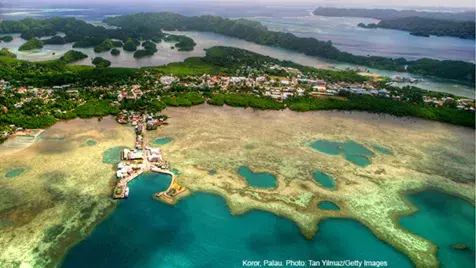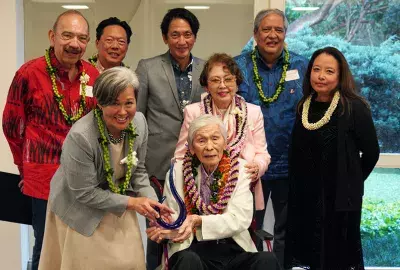Error message

OFFICE/DEPARTMENT
HONOLULU (Sept. 30, 2021) – Under a new five-year round of federal funding, the East-West Center (EWC) will be continuing to collaborate with the Pacific Regional Integrated Science and Assessment (Pacific RISA) program, which is designed to provide information for Pacific Island communities on building resilience to the effects of climate change. The program is funded by the US National Oceanic and Atmospheric Administration (NOAA).
EWC will receive more than $675,000 over the next five years to support research and stakeholder engagement for Pacific RISA, which is led by Center researchers Dr. Victoria Keener and Dr. Laura Brewington. Other administrative partners in the program include Arizona State University and the University of Hawai‘i Water Resources Research Center.
Established in 2003, Pacific RISA is one of 11 regional RISA programs supported by NOAA across the US. The region covered by the Pacific program includes Hawai‘i, the Commonwealth of the Northern Mariana Islands, Guam, Federated States of Micronesia, Republic of the Marshall Islands, Republic of Palau and American Sāmoa.
New phase
With the new round of funding, the Pacific RISA program will enter its fourth phase, titled “Building Equitable and Just Climate Solutions for Pacific Island Resilience to Compound Disasters and Extreme Events.”
“In the last few years, we have seen impacts from climate-related disasters such as extreme rainfall, drought, and storms compound with the pandemic across the Pacific Islands region,” Keener said. “Our ongoing collaboration with the East-West Center enables the Pacific RISA program to better respond to these regional compound threats.”
Major reports
Researchers with the project have collaborated closely with natural resource managers, policymakers, local and national governments, and nonprofit organizations to gather data and information as well as advocate for regional climate needs at national and international scales. Pacific RISA scientists have led such major reports as the Pacific regional section of the quadrennial US National Climate Assessment and the Pacific Islands Regional Climate Assessment series, which focuses on current and forecasted impacts in individual US-affiliated Pacific Island states and territories.
“Along with our network of stakeholders from over a decade of use-inspired research,” Brewington said, “this expanded partnership between ASU, the East-West Center and the University of Hawaiʻi positions the program to implement new adaptation initiatives for climate impacts and extremes across the region.”
For more information on the Pacific RISA program, please visit www.PacificRISA.org.
HONOLULU (Sept. 30, 2021) – Under a new five-year round of federal funding, the East-West Center (EWC) will be continuing to collaborate with the Pacific Regional Integrated Science and Assessment (Pacific RISA) program, which is designed to provide information for Pacific Island communities on building resilience to the effects of climate change. The program is funded by the US National Oceanic and Atmospheric Administration (NOAA).
EWC will receive more than $675,000 over the next five years to support research and stakeholder engagement for Pacific RISA, which is led by Center researchers Dr. Victoria Keener and Dr. Laura Brewington. Other administrative partners in the program include Arizona State University and the University of Hawai‘i Water Resources Research Center.
Established in 2003, Pacific RISA is one of 11 regional RISA programs supported by NOAA across the US. The region covered by the Pacific program includes Hawai‘i, the Commonwealth of the Northern Mariana Islands, Guam, Federated States of Micronesia, Republic of the Marshall Islands, Republic of Palau and American Sāmoa.
New phase
With the new round of funding, the Pacific RISA program will enter its fourth phase, titled “Building Equitable and Just Climate Solutions for Pacific Island Resilience to Compound Disasters and Extreme Events.”
“In the last few years, we have seen impacts from climate-related disasters such as extreme rainfall, drought, and storms compound with the pandemic across the Pacific Islands region,” Keener said. “Our ongoing collaboration with the East-West Center enables the Pacific RISA program to better respond to these regional compound threats.”
Major reports
Researchers with the project have collaborated closely with natural resource managers, policymakers, local and national governments, and nonprofit organizations to gather data and information as well as advocate for regional climate needs at national and international scales. Pacific RISA scientists have led such major reports as the Pacific regional section of the quadrennial US National Climate Assessment and the Pacific Islands Regional Climate Assessment series, which focuses on current and forecasted impacts in individual US-affiliated Pacific Island states and territories.
“Along with our network of stakeholders from over a decade of use-inspired research,” Brewington said, “this expanded partnership between ASU, the East-West Center and the University of Hawaiʻi positions the program to implement new adaptation initiatives for climate impacts and extremes across the region.”
For more information on the Pacific RISA program, please visit www.PacificRISA.org.







